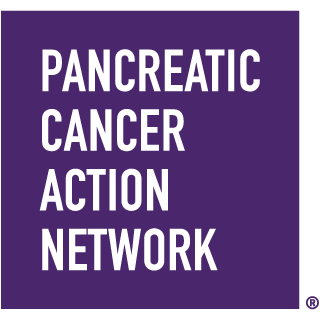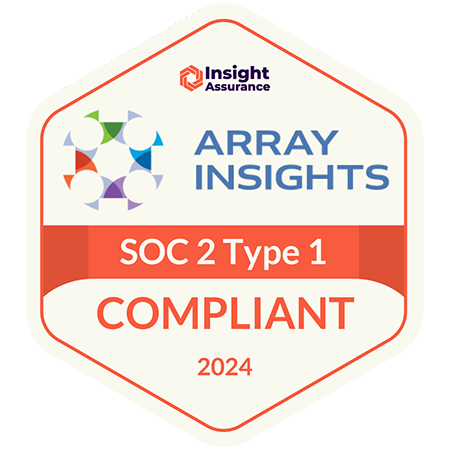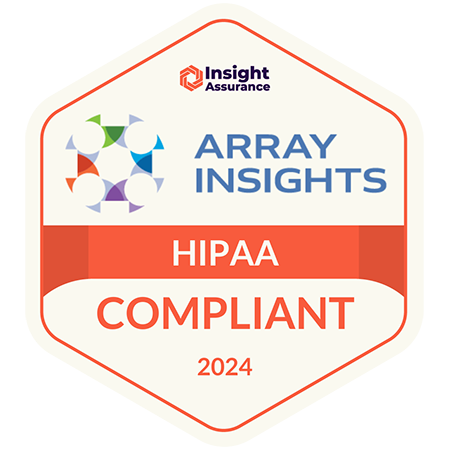Case Study: Pancreatic Cancer Action Network (PanCAN)

Pancreatic cancer is the deadliest of all major cancers. Patients face a five-year survival rate of just 12%.
Many patients only receive their diagnosis once the disease has already progressed to its advanced stages: when outcomes tend to be poor. There’s a pressing need for resources that help patients and physicians identify risk factors earlier — especially for underrepresented populations that might face elevated risk.
As a leading patient-focused organization, the Pancreatic Cancer Action Network (PanCAN) is teaming with Array Insights to drive equitable progress with patient data.
Partnership Goal
The PanCAN clinical data federation will help researchers better identify individuals at elevated risk for pancreatic cancer through their electronic health records. The project aims to help patients and medical professionals gain a better understanding of risk calculations for all demographics and populations. An abundance of data should also spur the discovery of more treatment options and produce better overall outcomes for pancreatic cancer patients.
The Bottom Line
PanCAN and Array Insights are developing a first-of-its-kind clinical data federation. The federation will use novel machine-learning technologies to help the medical community gain a deeper understanding of how pancreatic cancer manifests in a more representative population.
It’s suspected that pancreatic cancer risk varies between different racial and ethnic groups. To embrace representation and strive for equity, the data federation will merge patient data from a larger range of healthcare systems — giving a voice to diverse populations that had historically been underrepresented in pancreatic cancer research.
Array Insights is providing a data federation platform and data security technologies for PanCAN and its partners.
3 Challenges: Increasing representative data in pancreatic cancer research
Patient data is often the key to medical advancement. For clinical research to benefit every segment of the population, the data collected must adequately reflect the diversity we see in the real patient community.
PanCAN faced three key obstacles in its quest to drive better survival rates:
1 Pancreatic cancer data hasn’t historically been representative.
Early research suggests that pancreatic cancer risk factors vary between racial and ethnic groups. Unfortunately, many clinical trials don’t represent the country’s diversity; from 2015-2019, 76% of clinical trial participants were white, according to data from the Food and Drug Administration.
To drive meaningful results, the PanCAN team knew it needed to bring more representation and equity to pancreatic cancer research practices.
2 Data access was limited to a small number of healthcare systems.
For several years, PanCAN has been working on an electronic health record solution for the early detection of pancreatic cancer. This initiative focuses on identifying individuals with rarely-recognized symptoms, such as newly-elevated blood sugar paired with weight loss. Data from a small number of healthcare systems began to suggest that risk calculations varied greatly in different racial and ethnic groups. The only way to strengthen this theory was with more data from more healthcare systems.
3 Patients need better resources for early detection.
The deadliness of pancreatic cancer can be partially attributed to a lack of early diagnoses. Many patients only learn about their condition once it’s too late — when risk factors such as unexplained weight loss could have served as early clues.
Patients who are diagnosed in the early stages have better outcomes, as they can access more treatment options, including surgery.
3 Solutions: The PanCAN & Array Insights Strategy
With these obstacles in mind, PanCAN and Array Insights set out to build a data federation that drove results. Here’s how they’ve done it:
1 Apply a federated approach to patient data.
PanCAN’s data federation uses a pioneering form of patient-centric AI technology — machine learning and analytics on federated data. This approach ensures that patient data stays contained and that all data uses are loggable and auditable by PanCAN and their hospital and institutional partners. In other words, there’s no room for human error that leads to data security concerns.
It was extremely important to find a balance. PanCAN wanted to keep patients’ identities secure within their healthcare system, but still ensure that data could be used to spark discoveries and help patients of the future.
2 Merging data from multiple healthcare systems.
Data from a small collection of healthcare systems was already providing great insights for PanCAN and its community. Merging data from even more hospitals and institutions will allow researchers to gain a clearer picture of how changes in blood sugar, weight and other symptoms may help predict which groups are at greatest risk.
3 Gather more representative data for richer insights.
More participating institutions means more data — especially from traditionally underrepresented populations. The federation is helping ensure that PanCAN’s data is enriched to include people of different racial and ethnic backgrounds.
Partnership Impact
PanCAN has already welcomed its first hospital partner to the federation. Three additional hospitals across the country are excited to join in the near future. These health systems tend to serve underrepresented populations, which will help PanCAN work towards its goal of accelerating pancreatic cancer research for everyone.
“Healthcare-based nonprofits that serve communities on a national level can benefit from a partnership with Array Insights to break down data silos and learn from people being treated at diverse institutions and with varying backgrounds. We look forward to continuing this partnership and gaining insights about previously unappreciated or unrecognized symptoms of pancreatic cancer with the aim of developing strategies to detect the disease in its earlier, more treatable stages.”
Is your group looking to implement a next-generation, representative data federation like PanCAN?
Email us at business@arrayinsights.com or schedule a call to learn how your patient-centric organization can accelerate your research goals with technology that puts patient privacy first.


